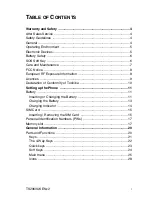
87
DRAFT
The louder the volume, the less time is required before your hearing could be affected. Hearing experts suggest
that to protect your hearing:
• Limit the amount of time you use your phone and/or headset at high volume.
• Avoid turning up the volume to block out noisy surroundings.
• Turn the volume down if you cannot hear people speaking with you.
• For information about how to set a maximum volume limit on your phone, see the features guide for your
phone.
Using Your phone Safely
Use of your phone while operating a vehicle is not recommended and is illegal in some areas. Be careful and
attentive while driving. Stop using your phone if you find it disruptive or distracting while operating any type of
vehicle or performing any other activity that requires your full attention.
Using headsets Safely
Use of headsets to listen to music while operating a vehicle is not recommended and is illegal in some areas. Be
careful and attentive while driving. Stop using this device if you find it disruptive or distracting while operating any
type of vehicle or performing any other activity that requires your full attention.
fda ConSUmer Update
The U.S. Food and Drug Administration’s Center for Devices and Radiological Health Consumer Update on Mobile
Phones:
1. Do wireless phones pose a health hazard?
The
available scientific evidence does not show that any health problems are associated with using wireless
phones. There is no proof, however, that wireless phones are absolutely safe. Wireless phones emit low levels
of Radio Frequency (RF) energy in the microwave range while being used. They also emit very low levels of
RF when in standby mode. Whereas high levels of RF can produce health effects (by heating tissue), exposure
to low-level RF that does not produce heating effects causes no known adverse health effects. Many studies
of low-level RF exposures have not found any biological effects. Some studies have suggested that some
biological effects may occur, but such findings have not been confirmed by additional research.
In some cases, other researchers have had difficulty in reproducing those studies, or in determining the reasons
for inconsistent results.
2. What is the FDA’s role concerning the safety of wireless phones?
Und
e
r the law, the FDA does not review the safety of radiation emitting consumer products such as wireless
phones before they can be sold, as it does with new drugs or medical devices. However, the agency has
authority to take action if wireless phones are shown to emit Radio Frequency (RF) energy at a level that is
hazardous to the user. In such a case, the FDA could require the manufacturers of wireless phones to notify
users of the health hazard and to repair, replace, or recall the phones so that the hazard no longer exists.
Although the existing scientific data do not justify FDA regulatory actions, the FDA has urged the wireless phone
industry to take a number of steps, including the following:
• Support needed research into possible biological effects of RF of the type emitted by wireless phones;
• Design wireless phones in a way that minimizes any RF exposure to the user that is not necessary for
device function; and
• Cooperate in providing users of wireless phones with the best possible information on possible effects of
wireless phone use on human health.
Summary of Contents for Terrain
Page 1: ...NEC Terrain User Guide ...











































